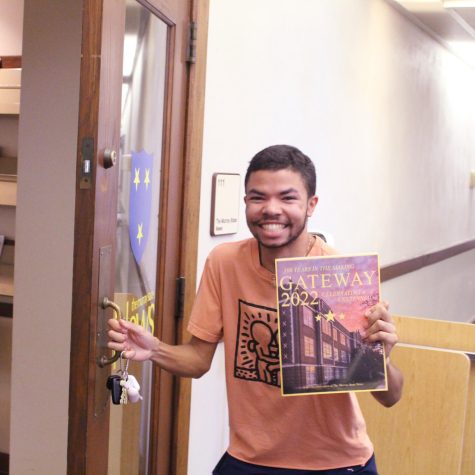Tove Lo explores feminine autonomy in ‘Dirt Femme’
October 20, 2022
Soaked in dazzling ‘80s-inspired synths, Tove Lo’s “Dirt Femme” takes pop lyricism in unique a direction focusing on feminine autonomy and spotlighting a vulnerable side of herself.
Swedish singer-songwriter Ebba Tove Elsa Nilsson, known professionally as Tove Lo, debuted in 2014 with her EP “Truth Serum,” which took listeners on a dive in her murky dance pop world and led to her being coined with the nickname, “the saddest girl in Sweden.”
Since her debut, Tove Lo has slid across the pop spectrum, taking on club beats and synths as well as early 2000s pop synths and beats. Despite her varying approaches to pop, her lyricism focuses on her womanhood but not in proximity to manhood, which is often seen in pop music—in a more autonomous fashion that writhes with Tove Lo’s confidence, sexiness and lonesomeness.
In “Dirt Femme,” Tove Lo shines a light on her femininity and womanhood but also her independence. Released by her label Pretty Swede Records,“Dirt Femme” is her fifth album, but first album as an independent artist, which further shows how Tove Lo’s autonomy exists in her personal life as well as her lyrics.
In an interview with Apple Music, Tove Lo said the independence allowed her to take extra time on the project.
“I had time to push myself and go to new places,” she said. “I had time for the details. I had time to be myself.”
“No One Dies from Love” kicks off the 12-track album and tells the story of Tove Lo trying to move on from a tumultuous relationship with someone who left her with emotional wounds. Though she is singing from this dark space, the song includes braided synths that dance along with a low clubby beat.
At first I was not sure what the lyrics seen in the title indicate, but Tove Lo isn’t dying from the heartbreak—she’s dying because of what the relationship put her through.
“Suburbia” describes the independence Tove Lo desires. She doesn’t want the conventional “picket fence” suburban lifestyle.
The track feels as though Tove Lo is talking to a lover and telling them what she wants, and doesn’t want, from their relationship.
“2 Die 4” is Tove Lo’s rendition of Y2K trance music. Tove Lo’s lyrics focus on connecting with another, a romantic partner, and hoping she catches his eye.
“True Romance,” a pop ballad, features a contained revving synth that helps the song gain intensity. Tove Lo sings about the danger of true romance and the idea of possibly losing her emotional dependence, and thus losing a piece of herself, as she falls in love with another.
Minimal instrumentals guiding this track, and Tove Lo’s vocals were recorded in one take, according to Apple Music. This captures an emotional progression as Tove Lo’s voice growls and strains toward the end of the song.
“Grapefruit” is an incredibly vulnerable synth-based track where Tove Lo talks about her past eating disorder in which she hyper focused on calorie consumption.
I don’t think I have ever seen a combination of lyrics and instrumentals like this that address such a heavy topic in a pop landscape.
“Call on Me,” one of the more dance-pop-style songs on the album, features English singer-songwriter and friend SG Lewis, who wrote the song and sent it to Tove Lo. In her interview with Apple Music, she said she tried reworking the song to make it deeper but felt as though doing so took away from the fun dance anthem.
“Attention Wh*re” features American rapper Channel Tres. Similar to the previous track, this song feels meant to be a bright dance track. Tove Lo and Channel Tres make for a combination I’ve never thought of, but it works so well.
The bridge interrupts the predominantly clubby dance instrumental, shifting to a pitter-pattering interlude over the beat, which feels like a knife cutting through the club daze as Tove Lo’s lyrics become sharper.
Tove Lo and Lewis co-wrote the next track, “Pineapple Slice” an allusion to receiving oral sex, playing with the rumor about the effects eating pineapple can have on the act.
Unlike the other tracks, “I’m to Blame” has an acoustic touch, backed by guitar, and her voice really works really well with it. In this song, Tove Lo questions whether a relationship can revive, and it feels as if it’s a battle between reality’s brutality and love’s hopefulness.
“How Long” closes the album, which brings the listeners back into Tove Lo’s synth-laced reality. Tove Lo asks her former lover how long they’ve been in love with another while she was dreaming of a future with them.
Overall, “Dirt Femme” is a deeper and more personal dive into Tove Lo’s world where we see some of her most vulnerable tracks yet. Her songwriting is very prominent throughout the album in a way that isn’t typical from pop albums under large labels.
A large focus of pop is to curate a sound rather than tell a clear story, which still makes for a great listen, but I admire how Tove Lo does not let her storytelling take the back seat.
Though the lyricism is strong, I do think the instrumentals could have been a little more personal and stands out from what we already hear a lot of in pop. I enjoy the clubby beats and would love to see her lean into that sound more as an album concept because Tove Lo has this “sad party girl” vibe.
Overall, “Dirt Femme” deserves a seven out of 10. It was a very strong return to music for Tove Lo, and now that she is an independent artist, I look forward to seeing what she will unleash on the music world next.
dberry11@murraystate.edu




























































































